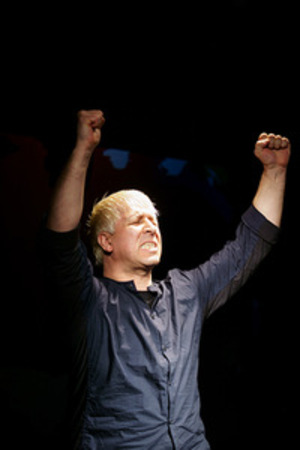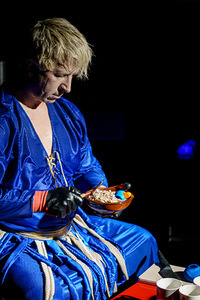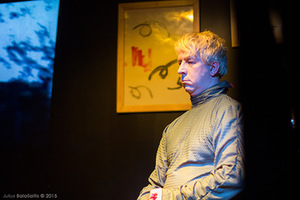Post Process theatre - from tradition to avant-garde 3
In brief: During the period when the tradition of theatrical culture and norms have been already established and creative innovations are limited to a few straying aways to the touchlines of the genre, artist Tomas Lagūnavičius enters the field of Lithuanian art of theatre. He questions the current situation and marches boldly outside the boundaries of the traditional theatre.
Artist who had studied acting and directing for many years in Klaipėda University, and as he himself says "developing his inner director", today feels free on the stage and is looking for new means of expression and directorial solutions. The head and founder of Post Process theatre who has created three thematically and stylistically different performances in three months ("Realist", "Consumer's Decalogue" and "Existential Journey through Vilnius") is actively preparing for the new premiere of his play "Escape" and is encouraging to look at theatre from a different perspective.
The desire to understand and the willingness to travel the road of avant-garde art brings up not only creative directing solutions but a non-traditional approach to theatre as a collective art phenomenon. T. Lagūnavičius denies the importance of collective in the theatre and proposes a concept of one-man theatre. Director, as creator of the whole of the play and its manager, according to the artist, has to take responsibility for all the elements of theatre and it is only possible when all the ideas and their implementations depend on him, aka director. The creative interventions of set designer, composer and choreographer only distorts the directorial ideas and creates additional meanings which sometimes can dislodge the whole play from consciously chosen direction and cause a chaos.
The idea of innovative theatre direction is a breath of fresh air in the Lithuanian theatre, which is dominated by well-established traditional tendencies, structures and forms. Born out of desire to test own skills and competences, continues to encourage raising new challenges not only as an artist, but as a person. The first direction purified by the director is morphological theatre which focuses mostly on the development of excellence and professionalism. Construction is a fundamental principle of this theatre direction. At first glance, different elements in the hands of experienced master are combined and create a new, artificial reality.
Post trance theatre provides a freedom and opportunity for a viewer to choose (he can dive into the performance or distance himself from it) and in the play of integrative theatre perceiver's freedom is absolutely limited. Viewer, he wishes it or not, is sucked into action and becomes one of the most important parts of the play - an actor. During such performance no one can distance themselves from their role and participation, because even a non-participation in this case will be considered as participation. This kind of theatre, with all its essence is already integrated into life itself, that is why sometimes viewers may feel confused and do not understand where they are, who they are and what they are doing. When does a performance begin and end? Or maybe it never ends, and the only things that change are the stage sets, costumes and props?



